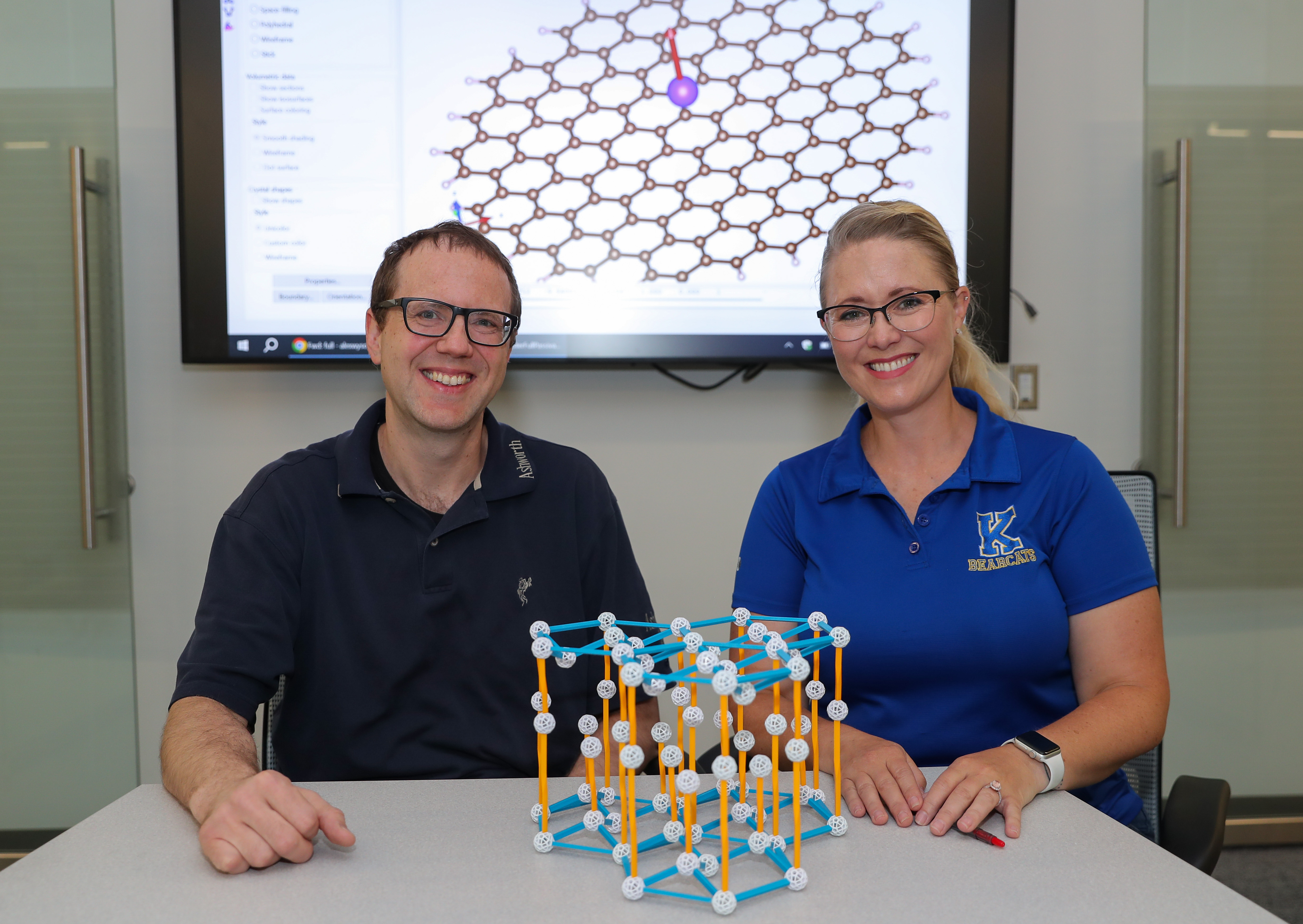Alison Klein, chemistry teacher at Kearney High School, went “back-to-school” this summer—to join a research team with Alex Wysocki, University of Nebraska at Kearney physics faculty
This summer, Kearney High School (KHS) science teacher Alison Klein added “RET” to her professional distinctions. The acronym RET does not stand for “retired” – far from it — but refers to “Research Experience for Teachers”: an extra way to enhance her teaching.
RETs are opportunities for teachers to use their summers to delve into science--with payment for their time--by pairing with mentors: typically, university faculty doing research in areas related to the teacher’s interest.
Klein teaches chemistry at KHS and leads the school’s Science Olympiad team; for this RET she connected with Aleksander Wysocki, assistant professor of physics at the University of Nebraska at Kearney (UNK), who is part of EQUATE (Emergent Quantum Materials and Technologies): a Nebraska research collaboration supported by the National Science Foundation.
The EQUATE research team includes engineers, physicists, and chemists at the University of Nebraska-Lincoln (prominently NCMN: the Nebraska Center for Materials and Nanoscience), plus the University of Nebraska at Omaha, and Creighton University, as well as UNK. Through these partners EQUATE also conducts outreach activities that help the public to better understand quantum science and to potentially inspire new generations of America’s scientists.
As an RET with Wysocki’s research team, Klein joined meetings with graduate students and focused at the nanoscale level (for reference, a nanometer is one billionth of a meter) for EQUATE -- now in Year 3 of a five-year term (2021-26): bringing a total of $20 million from NSF to Nebraska and growing quantum outputs and capabilities in the state.
Klein and Wysocki are working on “Lanthanide Adatoms on Graphene: Promising Spin Qubit Materials,” which fits into an EQUATE goal: to develop materials for new quantum technologies--specifically via qubits, the most basic building block in quantum systems. Wysocki added that one special feature of a qubit is that it can be in two different physical states at one time (for example: up or down in movement, or positive or negative in magnetic orientation or electrical charge).
Such quantum mechanics can serve in new types of electronic devices, including quantum computers that perform high-speed and high-volume computation – for next-level quantum computing to aid cryptography and other national security areas such as banking and finance.
Building quantum systems, Wysocki said, is fundamentally a big “materials science” challenge involving multiple perspectives. One of his team’s emphases is observing single atoms' magnetic moments when those atoms are deposited onto graphene (bonded carbon atoms in a sheet structure, one atom thick).
Klein said her summer workdays at UNK Physics “flew by.” With Wysocki’s group she used her chemistry background to help develop theoretical models to further “build the body of knowledge” about quantum, she explained.
After growing up in a family of engineers and pharmacists, Klein proudly identifies as a scientist. As a University of Nebraska-Lincoln undergraduate, she found she enjoyed conveying science to younger students.
Klein looks forward to engaging her classes as she carries out the nation’s Next Generation Science Standards (NGSS) in her KHS teaching—especially by using phenomena, including touch-screen electronics, to show how quantum materials can boost technology that’s familiar to students.
Wysocki said his willingness to host an RET stemmed from his longstanding motivation to communicate science to improve public understanding of research. His hiring at UNK in 2022 was funded by EQUATE; in his first semester at UNK he gave a Science Café talk on quantum topics for Sigma Xi, a group that links scientists and the community.
This RET connection helps Wysocki to take further steps: to interact with Klein’s classes and host workshops next summer to help introduce high school students to quantum research. The workshops will be supported by Nebraska EPSCoR (Established Program to Stimulate Competitive Research) as part of its Young Nebraska Scientists (YNS) program, using NSF EQUATE funding to provide science learning to students throughout the state.
Klein said, “I love being part of this research team.” Reflecting on her leap into quantum this summer, Klein plans to share her EQUATE RET experience at the National Science Teachers Association (NSTA) conference in Denver, later this year. She’ll also present a poster about her RET work at a research symposium this summer--then proudly display that poster outside her KHS classroom: to prompt conversations on the quantum world she explored, blocks away at UNK.

Photo caption: UNK Assistant Professor of Physics Alex Wysocki (left) and Kearney High School chemistry teacher Alison Klein collaborate on quantum materials in the summer of 2023 via an “RET” (Research Experience for Teachers) funded by the National Science Foundation via Nebraska EPSCoR. Photo by University of Nebraska at Kearney.
###